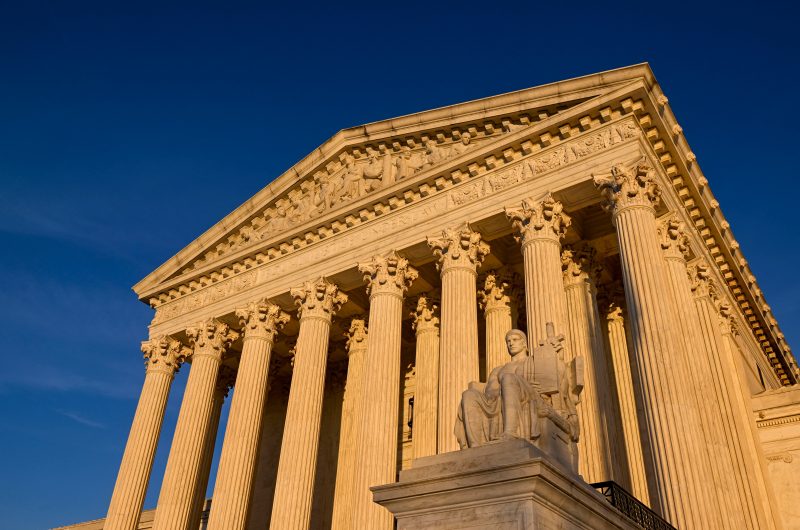
Supreme Court rules official likely violated NRA’s free speech rights
The Supreme Court on Thursday unanimously found a New York state official likely violated the free speech rights of the National Rifle Association by pressuring banks and insurers to cut ties with the gun-rights organization after the Parkland, Fla., high school massacre in 2018.
Justice Sonia Sotomayor, writing for the justices, said the court was reaffirming a six-decade-old precedent that government officials cannot use their substantial powers to try to quash points of view they do not like.
“Government officials cannot attempt to coerce private parties in order to punish or suppress views the government disfavors,” Sotomayor wrote. She added the NRA plausibly alleged the government official “did just that.”
The court returned the case to the U.S. Court of Appeals for the 2nd Circuit, where the NRA is pursuing a claim that Maria Vullo, the former superintendent of the New York Department of Financial Services (DFS), trampled the organization’s First Amendment rights.
The appeals court had previously sided with Vullo — who argued she was acting properly in enforcing the law and expressing her policy views — and dismissed the NRA’s lawsuit.
In a case of strange legal bedfellows, the conservative NRA teamed up with the liberal American Civil Liberties Union to challenge Vullo’s actions. The ACLU said Vullo had abused her authority and set a dangerous precedent that other states might follow.
“If the court had allowed New York to blacklist a powerful organization like the NRA, government officials would have had even greater power to target less powerful organizations — especially those who speak for our most vulnerable communities,” the ACLU said in a statement after the ruling.
As DFS superintendent, Vullo had broad powers to regulate insurance companies and financial service institutions doing business in New York, including referring cases for prosecution, announcing civil charges and entering into consent decrees.
Vullo began investigating NRA-affiliated insurers for violations in 2017, but the case truly got rolling after the 2018 mass shooting at Marjory Stoneman Douglas High School. The NRA and other gun advocacy groups experienced an intense backlash following the tragedy.
The NRA contends Vullo pressured insurers to cut their ties with the organization and met with executives of insurance companies doing business with the NRA to make her position clear.
In one meeting, Vullo told executives she wanted to leverage the power of DFS to combat the availability of guns and weaken the NRA, according to the Supreme Court decision. She also allegedly said she would be less likely to pursue regulatory action against insurers that did not have ties to the NRA.
Vullo followed up by issuing regulatory guidance and a press release, along with then-New York Gov. Andrew M. Cuomo (D), urging companies not to do business with the NRA.
Some insurance companies subsequently severed their ties with the NRA. The NRA then sued Vullo, DFS and Cuomo.
The District Court denied Vullo’s motion to dismiss the NRA’s claim that she violated the First Amendment by coercing entities regulated by DFS in an attempt to punish the NRA. The Second Circuit then reversed that ruling, and the NRA appealed to the Supreme Court.
Neal Katyal, an attorney for Vullo, said the ruling was disappointing and the NRA’s allegations about the meeting with executives are false.
‘Ms. Vullo did not violate anyone’s First Amendment rights. Ms. Vullo enforced the insurance law against admitted violations by insurance entities, and industry letters such as those issued by Ms. Vullo are routine and important tools regulators use to inform and advise the entities they oversee about risks.”
Vullo’s attorneys also wrote in a brief to the high court that Vullo did not coerce the companies.
“They did not threaten that DFS would take any action against any entity for not severing those ties,” the brief says. “And indeed, DFS took no such action.”
Sotomayor’s opinion in National Rifle Association of America v. Vullo makes clear that Vullo is free to criticize the NRA and pursue violations of New York insurance law, but says she overstepped when she threatened to wield her power against the NRA’s gun advocacy.
That distinction is significant in balancing free speech and government action, Alex Abdo, litigation director of the Knight First Amendment Institute at Columbia University, said in a statement.
He called the ruling “an important decision that reaffirms the bedrock First Amendment rule that the government may not coerce others to suppress constitutionally protected speech.”
“The ruling also appropriately recognizes that, while the government may not employ coercion, it must be allowed to attempt to persuade the public of its views,” Abdo said. “Our government could not govern effectively if it were not permitted to speak out, forcefully, on the topics of the day.”
The case was one of two before the Supreme Court this term dealing with the government and free speech. In Murthy v. Missouri, the court will decide whether the Biden administration coerced social media platforms into muzzling free speech in an effort to crack down on misinformation. A decision is expected by the end of June.
Ann Marimow contributed to this report.
